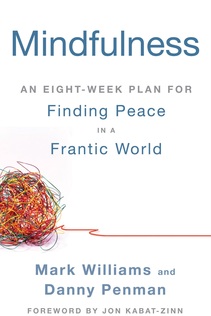This blog post is also available on Medium:
Back in January, I could tell that this semester was going to be extremely stressful. I would be working on a couple of research papers, I would be a Teaching Assistant for a notoriously time-consuming class, and I would be the house manager of the co-op that I live in. So when I saw the following announcement in an e-mail, it sparked my interest:
Mindfulness Seminar For Spring Semester
Consider practicing stress reduction, reduced rumination, enhanced self-insight, more cognitive flexibility, increased working memory, and more through the Mindfulness Seminar being offered by Werner. There will be only a maximum of 15 participants!
The commitment was low, only one hour per week. Plus, I already knew the instructor, Werner, so I was confident that the seminar would be worth my time. I ended up enrolling. And I am very happy that I did. The seminar ended on the week of March 17. Here's a short review:

The seminar followed the book Mindfulness: An Eight-Week Plan for Finding Peace in a Frantic World by Mark Williams and Danny Penman, both PhDs. The former is a professor of clinical psychology at the University of Oxford, while the latter is a journalist.
The book takes both a scientific and a spiritual (but not religious or ritualistic) approach to meditation that doesn't have much to do with our usual perception of meditation. No need to sit cross-legged or burn candles or incense.
However, the biggest difference is that the meditation is guided. You are not left on your own to "think of nothing" for one hour. No. The book comes with audio tracks, 8 of them, that slowly introduce you to different aspects of Mindfulness Meditation. Each meditation/track is to be practiced 6 out of the 7 days of each week. Sounds rigorous, but the duration of each track is about 7'. There's a very short one (3') and a longer one (15'). You can listen to a few of the audio tracks here to get a sense of what I'm taking about: http://franticworld.com/free-meditations-from-mindfulness/ An added bonus is the narrator's awesome British accent!
Something that many seminar participants found motivating is that the meditations do not discourage you or punish you when you get distracted and let your mind wander. On the contrary, "noticing that the mind has gone and bringing it back again and again and again is the meditation - this is the practice."
The book takes both a scientific and a spiritual (but not religious or ritualistic) approach to meditation that doesn't have much to do with our usual perception of meditation. No need to sit cross-legged or burn candles or incense.
However, the biggest difference is that the meditation is guided. You are not left on your own to "think of nothing" for one hour. No. The book comes with audio tracks, 8 of them, that slowly introduce you to different aspects of Mindfulness Meditation. Each meditation/track is to be practiced 6 out of the 7 days of each week. Sounds rigorous, but the duration of each track is about 7'. There's a very short one (3') and a longer one (15'). You can listen to a few of the audio tracks here to get a sense of what I'm taking about: http://franticworld.com/free-meditations-from-mindfulness/ An added bonus is the narrator's awesome British accent!
Something that many seminar participants found motivating is that the meditations do not discourage you or punish you when you get distracted and let your mind wander. On the contrary, "noticing that the mind has gone and bringing it back again and again and again is the meditation - this is the practice."
Let me say right now that the purpose of the book, and the 8 week seminar, is not to turn you into a caricature little Buddha that is "happy all the time" and doesn't care about anything. Its purpose is to make us realize that we go through life in a walking daze. Jumping from one task to the next, multitasking, negative self-talk, stress, reactive impulses and emotions all slowly wreak havoc in our minds, our bodies, and our lives. As the book says "Meditation helps cultivate a deep and compassionate awareness that allows you to assess your goals and find the optimum path towards realizing your deepest values." The point is to see the world as it is, not as our thoughts describe it to us.
What I just described seems to be in stark contrast with the culture of "hard work and productivity at all costs" that is very prominent these days, especially in the US. However, the "work hard, play hard" motto that I used to swear by is consistent with Mindfulness. I have personally found that I am more productive, and more effective in general, after incorporating the practices of Mindfulness Meditation in my daily life.
I could go on and on about what I personally got from the Mindfulness seminar, but instead I'm going to stop here and encourage you to give it a try. If you go to Cornell, keep an eye out for the announcements. Hopefully the seminar will be offered next semester as well. If you don't go to Cornell, you could try the free audio tracks I posted above. However, I highly recommend buying the book; it's an indispensable part of the seminar.
Thanks for reading! Feel free to ask me about Mindfulness Meditation in the comments section below.
You can also signup to my mailing list to be notified of new blog posts and other interesting updates! Or you can subscribe to the blog's RSS feed (copy URL of RSS Feed button and paste it in your RSS Feed reader).
~ Spyros
You can also signup to my mailing list to be notified of new blog posts and other interesting updates! Or you can subscribe to the blog's RSS feed (copy URL of RSS Feed button and paste it in your RSS Feed reader).
~ Spyros




